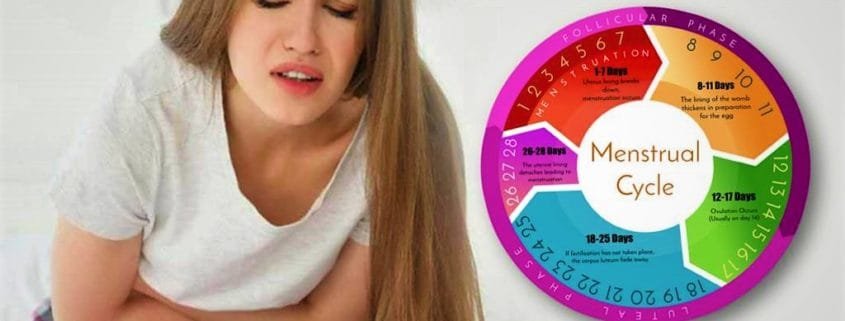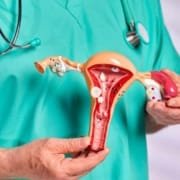Periods and Period Problems
What are Periods?
A period is the part of the menstrual cycle when women bleed from their vagina for a few days. For most women this happens every 28 days or so, but it’s common for periods to start sooner or later than this, ranging from day 21 to day 40. Period usually last for about 5 days, but it can vary between 3 and 8 days.
The bleeding is usually heaviest during the first two days. When your period is at its heaviest, the blood will appear red. On lighter days, it may range from pink to brown or even black. A normal woman loses about 30 to 72 milliliters (5 to 12 teaspoons) of blood during the period, although some women bleed more heavily than this.
When do Periods Start ?
Periods usually start to occur around the same time as other changes happen to the body at the time of puberty, such as starting to develop breasts or to grow pubic hair. Eleven years is the average age for puberty to start in girls. A girl’s monthly periods usually begin at around the age of twelve, but it is normal to start at any time between the ages of 9 and 15. A delay in starting your period is usually not a cause for concern. Most girls will have regular periods from age 16 to 18.
Sanitary Products
Sanitary products are designed to absorb or collect menstrual blood. The main types of sanitary products are:
- Sanitary Pads: These are strips of padding with a sticky side that attaches to your underwear. The absorbent material on one side soaks up the blood.
- Pantyliners: A smaller and thinner type of sanitary pad for use on days when your period is very light.
- Tampons: Small tubes of cotton wool inserted into the vagina to absorb blood before it exits the body. They have a string at one end for easy removal.
- Menstrual Cup: A menstrual cup is a reusable, bell-shaped device inserted into the vagina to collect menstrual fluid, offering up to 12 hours of protection. Made from medical-grade silicone, rubber, or latex, it is an eco-friendly alternative to traditional sanitary products.
Changes in Periods
Periods can change, they may last longer or get lighter. This doesn’t necessarily indicate a problem, but it should be investigated. consult your gynecologist if you observe abnormal changes. Bleeding between periods, bleeding after having sex, or bleeding after the menopause needs to be checked by a gynecologist. It might be due to an infection, abnormalities in the cervix, or, in rare instances, cancer.
If you’ve missed a period and have had sex, pregnancy could be the cause. Consult your gynecologist if you’ve taken a pregnancy test and the result is negative (you’re not pregnant) and you’ve missed 3 consecutive periods. She or he will investigate the cause and recommend any necessary treatment.
Getting Pregnant
Working out when you can get pregnant, what is your fertile period – can be difficult. It’s around the time you ovulate, which is about 12 to 14 days before the start of your next period. But sperm can survive inside a woman’s body for days before ovulation occurs. This means your fertile period starts earlier in your cycle. (for more details see “Understanding Ovulation and Fertile Period“)
You can calculate when your period will start and your peak ovulation times using this advanced ovulation calculator.
You can’t get pregnant if you don’t ovulate. Some hormonal methods of contraception, such as the combined pill, contraceptive patch and contraceptive injection, work by preventing ovulation.
When do Periods Stop ?
Periods will continue until you reach menopause, which typically occurs between the late 40s and mid-50s. In the United States, the average age of menopause is 51 years, with most women experiencing it between 48 and 55 years. Premature menopause is defined as occurring before the age of 40.
Before stopping altogether, periods may become less frequent over several months or years. In some cases, they can stop suddenly. (Read more about “Menopause“)
What Are Menstrual Problems ?
Menstrual cycles often bring a variety of uncomfortable symptoms leading up to your period. The most common issues fall under premenstrual syndrome (PMS), which includes mild cramping and fatigue. These symptoms usually subside once your period begins.
However, more serious menstrual problems can also occur. Menstruation that is too heavy or too light, or the complete absence of a cycle, may indicate underlying issues contributing to an abnormal menstrual cycle.
A “normal” menstrual cycle varies for every woman. What is regular for you might be abnormal for someone else. It’s important to understand your own cycle and recognize when something feels off. If you experience significant changes or have concerns, consulting with a healthcare provider can help identify and address any potential problems.
Following are several different menstrual problems that you may experience.
Premenstrual Syndrome (PMS)
Premenstrual syndrome (PMS) is believed to be connected to changing hormone levels throughout the menstrual cycle. Not all women experience PMS, and among those who do, the range and severity of symptoms can vary widely. Common symptoms may include:
- Mood swings
- Feeling depressed or irritable
- Headaches
- Tiredness
- Bloating
- Breast tenderness
Symptoms typically appear and can intensify during the second half of the menstrual cycle, then ease and disappear after your period starts. (For more details see “Premenstrual syndrome – PMS“)
Painful Periods
Pain during periods is common. It is caused by the womb contracting to expel blood. Exercise may help relieve the pain, as well as taking over-the-counter painkillers, such as paracetamol or ibuprofen. If the pain is severe enough to impact your daily life, consult your doctor. Hormonal contraception (such as the combined pill, the intrauterine system (IUS), the contraceptive patch or the contraceptive injection) can reduce period pain. (For more details see “Painful Periods – Menstrual Cramps – Dysmenorrhea“)
Heavy Periods
Some women naturally have heavier periods than others. Heavy periods, also known as menorrhagia, can be caused by hormonal imbalances, uterine fibroids, polyps, or other underlying health conditions. Additionally, certain medications and medical conditions like thyroid disorders can contribute to heavy menstrual bleeding. However, if your periods are so heavy that they significantly impact your daily life, it is important to talk to your doctor. Discuss the frequency with which you need to change your sanitary protection (towels, tampons, or menstrual cup) to provide a clear picture of your bleeding. For more information, see “Abnormal Uterine Bleeding.”
Irregular Periods
A typical period lasts between two to seven days, with the average being five days. While the average menstrual cycle is 28 days, regular cycles can range from 21 to 40 days and still be considered normal. However, some women experience irregular menstrual cycles, characterized by:
- Wide variations in the time between periods (arriving early or late)
- Changes in the amount of blood loss (heavy or light periods)
- Variations in the number of days the period lasts
Irregular periods are common during puberty and just before menopause. Changing your method of contraception can also disrupt your normal menstrual cycle.
Stopped or Missed Periods
There are many reasons why a woman might miss her usual monthly period or why periods might stop altogether. Most of the time, the cause is not serious. Some common reasons include:
- Stress
- Significant weight loss or gain
- Excessive exercise
- Hormonal imbalances
- Pregnancy
- Breastfeeding
If you experience stopped or missed periods, it’s best to consult with a healthcare professional to determine the underlying cause and receive appropriate guidance.
Endometriosis
Endometriosis is a condition where tissue similar to the lining of the womb (endometrium) grows in other areas of the body, such as the ovaries and fallopian tubes. While not all women experience symptoms, endometriosis can cause:
- Painful, heavy, or irregular periods
- Pelvic pain
- Pain or discomfort during bowel movements
- Pain during or after sex
- Persistent fatigue
- Bleeding from the rectum
If you have symptoms of endometriosis that impact your life, consult your gynecologist for diagnosis and treatment. For more information, see “Endometriosis: Symptoms, Causes and Treatment“.
Ovulation Pain
Some women experience one-sided pain in their lower abdomen during ovulation. This pain, can vary from a dull cramp to a sharp, sudden twinge. It may last a few minutes or continue for a day or two. Some women also notice a small amount of vaginal bleeding during ovulation.
Painful ovulation can often be relieved with simple remedies such as soaking in a hot bath or taking over-the-counter painkillers like paracetamol. If the pain is severe or persistent, consult your healthcare provider.
Conclusion
Understanding menstruation and its associated problems is crucial for maintaining reproductive health. Recognizing symptoms and knowing when to seek medical advice can help manage any issues effectively. Stay informed about your menstrual cycle and consult healthcare professionals for guidance. Awareness and proactive care are key to overall well-being.











